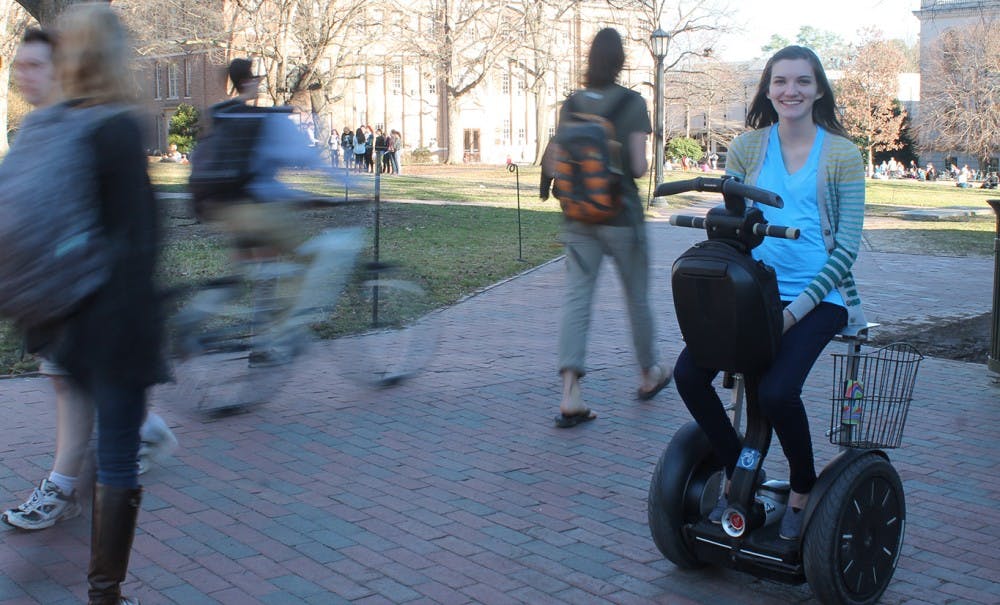“I played soccer in second grade, and I could still run in fifth grade,” she said.
“My dad bribed me with an iPod to run the mile in fifth grade — I ran it in 15:02. They didn’t know at the time.”
While most students jot down notes about intramural sports games and club meetings in their agendas, Lane’s planning necessitates a different mode of thinking.
“I have to make sure all the buildings are accessible, the seats are okay, the buildings have an elevator,” she said.
Lane said UNC Accessibility Resources & Service has been quick to respond to her needs.
“Nearly all buildings are accessible, and accessibility resources has always been quick to move my class if it’s in an inaccessible building,” she said.
Brittne Stevens, executive director for the Muscular Dystrophy Association, said students with muscular dystrophy are often the only ones at their school with the condition.
“That is a large issue,” Stevens said. “As your muscles have a degeneration, it affects your ability to write and carry books. It affects participation in physical education and any real-type sport.”
Stevens said the MDA works to make the transition from high school to college easier by providing guidance to students on issues related to mobility and socializing.
The level of difficulty students with muscular dystrophy face varies according to the college or university, she said.
“Newer facilities are often more equipped from the start,” Stevens said. “When we’re working to accomodate and help students, we try to make sure that we’re looking at it by a case-by-case scenario.”
Lane does not find these challenges debilitating.
To get the day's news and headlines in your inbox each morning, sign up for our email newsletters.
She has become an on-campus wonder as she accelerates past students on her way to class or weaves through crowds of students at intersections. The uniqueness of her Segway is something Lane takes pride in, and she is hardly shaken when she receives stares, pointing fingers and the occasional camera flash.
She has heard several odd comments regarding her Segway, as it is somewhat of a novelty when she glides down Franklin Street.
“People ask a lot of weird things all the time,” Lane said. “There was a guy who offered me a free pizza for letting him ride my Segway.”
But even though Lane loves her Segway, she said she does not want people to look at her and just see the motorized vehicle.
Since her fingers hit the piano keys in third grade, Lane has been passionate about music. Skilled in multiple instruments, Lane said she loves percussion and piano and is in the wind ensemble at UNC.
“Hearing or playing a great piece of music just makes everything else in life fade away; it’s really an indescribable feeling,” Lane said.
Pulling out her phone and pointing to a picture of a six-year-old girl she tutors in music, she explained how she likes to teach lessons for Musical Empowerment, a nonprofit organization that partners UNC students with underprivileged kids from the Chapel Hill-Carrboro area.
“It’s been amazing to see her face light up when she understands something, and her eager attitude toward learning — and ability to focus for 40 minutes at such a young age — is inspiring,” Lane said of her student.
Lane herself is the agent of inspiration.
Nick Battista, a math Ph.D. candidate who worked with Lane in a UNC research program in the summer of 2013, said he was impressed with Lane’s capacity to learn computer simulations in record-fast time.
“She gave one of the best research presentations that I’ve ever seen,” Battista said. “Just the way she delivered the talk. She clearly doesn’t let her disability hinder her at all.”
Sophomore Nikki Santiago, one of Lane’s closest friends, said she is inspired by Lane’s ability to make her forget she even has a disability.
“Of course you’re curious about the Segway and want to ask about it, but when you’re just talking to her, the more I’ve gotten to know her, you realize she’s just a regular person, and she’s happy-go-lucky.
“She doesn’t view her disease as something that you pity her for.”
university@dailytarheel.com



